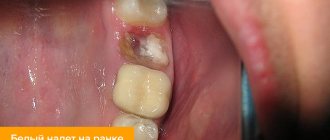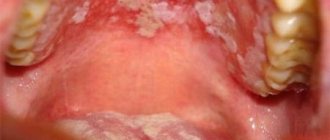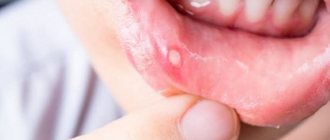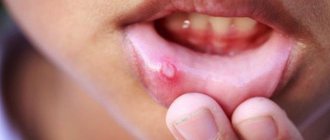What is stomatitis and what types exist?
The name of the disease indicates its exact location; translated from Latin “stoma” means mouth. Stomatitis is an inflammatory lesion of the oral mucosa (most often ulcerative). Both adults and children can get sick. But the disease affects children more often. This is due to the fact that the mucous membrane at this age is easily infected by pathogenic microflora, because the child’s body is not yet perfect, local and general protective reactions are not sufficiently developed. Statistics show that almost 80% of young children have suffered from this disease at least once.
Stomatitis is the general name for a whole group of diseases of the oral mucosa. Therefore, each of them has its own symptoms and its own treatment methods. Depending on the etiology, stomatitis is divided into several types:
- viral, including herpes - has a viral nature, infection occurs by airborne droplets. The virus can exist on objects (clothing, toys, etc.) for some time. The initial symptoms are similar to those of ARVI: lethargy, fever, runny nose, cough (not always). On the second or third day, light ulcers with a red border appear on the tongue, mucous membranes of the cheeks and lips;
- traumatic - inflammation is provoked by mechanical damage to the inner surface of the mouth, for example, a burn from a hot drink or food, a scratch from a toy stuck in the mouth, biting if the child has an incorrect bite;
- allergic – the inflammatory process is provoked by the entry into the body of a substance that causes an allergic reaction. Most often caused by drugs;
- candidiasis (fungal) - begins when the mucous membrane is infected with the fungus Candida (“thrush”). A striking symptom is a dense white coating on the tongue.
What is a disease
Stomatitis is considered a lesion of the oral mucosa.
The reasons for the development of this pathology are:
- infection by infections (viruses, bacteria, fungi);
- medicines;
- autoimmune processes.
Children develop painful ulcers in their mouths. They are quite deep, but heal without scarring. If the baby has immune disorders, then the ulcerative process is continuous. Previously formed ulcers simply do not have time to heal before new ones appear. The acute process becomes chronic. That is why it is important that nutrition for stomatitis is gentle, at the same time complete and varied.
Symptoms
Signs indicating that a baby is suffering from stomatitis are divided into two types: local and general. It is not difficult to recognize them, especially if the baby already knows how to speak and can tell where he feels discomfort. If a baby is sick, the main symptom is general restlessness and crying. Parents should carefully examine his mouth and make sure that there is (or is not) an inflammatory process on the mucous membrane.
Local symptoms:
- blisters, sores or plaque on the inner surface of the lips, cheeks and/or tongue, pharynx;
- marks from biting, burns or scratches;
- swelling and redness of the mucous membrane next to the lesions;
- bad breath.
Are common:
- increase in body temperature (from slight to critical);
- increased size of lymph nodes;
- refusal to eat;
- lethargy;
- moodiness;
- nervousness.
Note to parents: symptoms can manifest themselves both complexly and individually. But the presence of even one of the listed manifestations of the disease is a reason to visit a doctor.
How to treat stomatitis in a child?
Stomatitis in children
Canker sores are inflammations in a child's mouth that can cause sores on the tongue, gums, cheeks, and throat. This situation is more common in children under 3 years of age, but can also occur in adolescence. In most cases, stomatitis is caused by the herpes virus, and in this case is called herpetic gingivostomatitis.
Treatment is carried out as prescribed by the pediatrician, who recommends keeping the child's mouth clean at all times, as well as using medications to relieve symptoms and, in some cases, relieve discomfort.
What can cause stomatitis in children?
Stomatitis can occur for several reasons, but the most common causes are:
- decreased immune system defenses,
- habit of putting dirty hands and objects (toys) in the mouth,
- as a result of infection with influenza viruses, herpes simplex or chickenpox, Coxsackie viruses, enteroviruses,
- candidiasis (thrush).
Other pathogens include bacteria and fungi. Temperature or mechanical trauma to the oral cavity and allergic reactions may also be the cause. Vitamin B or C deficiency plays a role.
Main symptoms
Pediatric stomatitis usually presents with symptoms such as irritability and poor appetite because when food gets into the wound, it causes pain. Other symptoms that may occur with stomatitis:
- Mouth ulcers or gum inflammation;
- Pain in the mouth and throat when swallowing;
- There may be a temperature above 38°C;
- Sores on the lips;
- Bad breath.
These symptoms can appear at the same time, but most often only the ulcers appear. In addition to stomatitis, there are other diseases that can cause mouth ulcers, such as Coxsackievirus, which causes foot-and-mouth disease. Therefore, it is important for the pediatrician to timely assess the symptoms and do tests in order to make a correct diagnosis.
What is observed in a child’s mouth with stomatitis?
Upon examination, painful erosions, ulcers and blisters may be observed on the mucous membrane of the inner surface of the cheeks, gums, lips, tongue and, less commonly, in the back of the throat. Enlarged lymph nodes in the neck and under the jaw are also common.
The gums may be slightly swollen, red, ulcerated, and bleed easily.
When the cause of the disease is viral, oral lesions may last 7 to 10 days, although general symptoms disappear sooner.
Is it possible to easily diagnose the pathogen?
Microbiological testing can be done, but the methods used are not simple.
Samples must be transported and cultured in a suitable environment. Results will be received in approximately 15 days. Rapid diagnostic methods are also available, such as direct staining of vesicle contents with fluorescent antibodies.
Is there any specific treatment?
Treatment of stomatitis should be prescribed by a pediatrician or dentist and last about 2 weeks. However, it is important to be careful with the food your child eats and maintain proper oral hygiene to avoid the growth of microorganisms in the ulcer.
Most often, gingivostomatitis resolves spontaneously and requires only symptomatic pain treatment or antiseptics to promote local healing. In children, special attention should be paid to their hydration by offering liquids in divided form, cold or at room temperature. Sour, salty or spice-rich foods should be avoided.
Discomfort can be reduced with paracetamol or ibuprofen taken by mouth. If a yeast infection is suspected, topical application or antifungal rinses are usually effective. In some cases, the use of antiviral drugs such as acyclovir may be recommended for gingivostomatitis caused by herpes viruses. This medication helps heal sores in the mouth, but should only be used with a prescription from your pediatrician. Treatment of herpes infection with acyclovir is not required for mild infections in children with sufficiently strong immunity.
How to feed a baby or child with stomatitis?
It is important that the child’s feeding is not interrupted if there is an illness. However, it is important to be careful to avoid aggravating symptoms:
- Avoid acidic foods such as orange, kiwi or pineapple;
- Offer cold liquids such as fruit juices or smoothies;
- Eating pureed or liquid foods, such as soups;
- Choose cold foods such as yogurt, fruit compotes and gelatin.
How can you prevent stomatitis?
Infections caused by the herpes simplex virus often occur in schoolchildren. Most of these infections are asymptomatic; the virus is excreted in saliva in the absence of clinical manifestations of the disease. Children with this condition should remain at home until the end of treatment. The best form of prevention is strict hand-washing, avoiding direct skin-to-skin contact with others, and not sharing glasses or utensils.
What happens if stomatitis is not treated?
Some parents do not take their child’s stomatitis seriously, they say, “it will go away on its own.” Such an attitude towards the baby’s health can lead to serious consequences. Without treatment, the infection can spread to the skin of the face. There is also a high risk of secondary infection. And this already threatens general intoxication of the body, damage to the nervous system, etc., even death. Therefore, doctors strongly recommend that if symptoms of the disease are detected, show the child to a specialist in order to avoid negative health consequences.
Treatment methods
Due to the fact that the etiology of each type of stomatitis is different, the approaches to treatment are also different. For example, a fungus needs to be fought with an antifungal drug, herpes with an antiherpes drug, allergies with an antihistamine, etc. Therefore, the main task of a doctor is to diagnose stomatitis, identify the cause of the disease and prescribe appropriate treatment. Therapy is carried out in two directions: relief of general symptoms and local effects on mucosal lesions. As a rule, the doctor prescribes medications and antiseptic treatment of the oral cavity in the form of applications and rinses.
Features of the disease
In most cases, children suffer from candidal stomatitis, which develops against the background of the proliferation of pathogenic microflora. Due to weak immunity, the body is unable to restrain the growth of bacteria; their number rapidly increases. Localized in the oral cavity - on the gums, tongue, cheeks.
External signs:
- white coating;
- redness of the mucous membrane;
- purulent formations;
- sores.
A small child refuses to eat. In the absence of proper treatment, body temperature rises, chills, fever, and weakness appear.
In the viral, herpetic form, pathogenic cells enter the blood, spread throughout the body, and are localized in the mouth. The external signs of the disease are identical. Additionally, body temperature rises, weakness and malaise are present. The gums bleed, swell, become covered with plaque and ulcers. The herpes virus remains in the body for life. A strong immune system inhibits the manifestation of the disease. When it weakens, symptoms may appear again, but not so pronounced.
Allergic stomatitis manifests itself against the background of weak immunity, but the provocateurs are products containing allergens and personal hygiene products. Food, toothpaste, and mouthwash can cause the disease.
What do doctors advise for home care?
The specialist makes a diagnosis and prescribes treatment, and the implementation of all instructions falls entirely on the shoulders of the parents. Caring for a small child with stomatitis contains many nuances. For example, during this period you should feed your baby only warm food with a mushy consistency, excluding citrus, sour and spicy foods. After eating, be sure to rinse your mouth. If the baby is still very small, then after eating you should give him a little boiled water to drink. Treatment of the oral cavity and application of gels prescribed by a doctor should be done with a special fabric fingertip or a finger wrapped in a bandage (the bandage should then be thrown away).
Important: self-medication is dangerous. Only a doctor can correctly diagnose and give the correct therapeutic recommendations.
What can you eat if you have stomatitis?
Inflamed mucous membranes and ulcers in the mouth make it impossible to eat as usual. Therefore, during illness you have to change your eating habits. This is necessary to reduce discomfort, reduce inflammation and restore normal microflora. Warm food with a soft consistency that does not irritate the mucous membrane is recommended. If you have stomatitis, you can eat:
- warm fermented milk products (ryazhenka, kefir)
- compotes and jelly from fresh berries or dried fruits
- liquid porridge
- meat and fish, steamed and pureed
- soups with lean broth
- cottage cheese dishes
If a child suffers from stomatitis, the diet depends on the age of the child and the form of the disease. Give your baby warm drinks more often, which soften the mucous membrane and reduce the process of intoxication, especially after feeding. This can be a chamomile decoction or even simple boiled water. And if stomatitis occurs in an infant, then pay increased attention to sterilizing bottles and nipples and treating the breast before and after feeding. Regardless of the patient’s age, the stop list for patients with stomatitis includes:
- bread
- juices, berries and fruits
- smoked products
- spicy and highly salty foods
- chips and crackers
- fried fish and meat dishes
If you have stomatitis, you will have to temporarily change your usual diet in favor of liquid or semi-liquid foods. At the same time, you should not even eat soft bread or cookies, as they can injure the inflamed mucous membrane.
Methods for preventing stomatitis
- Preventative visits to the dentist (twice a year), if necessary, dental treatment
- Strengthening the immune system (regime, good nutrition, hardening)
- Maintaining oral hygiene
- Getting rid of bad habits (finger sucking, toys, pencils, etc.)
- Maintaining household hygiene (thorough cleaning of premises, washing toys)
- Timely treatment of gastrointestinal diseases
The dental network offers services for the treatment of stomatitis in children. Our specialists are highly qualified and regularly improve their skills in leading clinics in Russia and Europe. The pediatric dentist will diagnose and prescribe effective treatment. We have a system of family and cumulative discounts.
You can contact any of the branches of our center in Moscow within walking distance from metro stations:
- Art. Alekseevskaya (VDNKh district, etc. Mira), address: st. 3rd Mytishchiskaya house 3, building 2;
- Art. Shelepikha, address: Shelepikhinskaya embankment, address: building 34, building 1.
Stomatitis is a serious disease; do not expect that it will go away on its own without consequences. Remember that your child's health depends only on you. If you notice the symptoms described in the article, sign up for “Smile” dentistry and get qualified help. We are waiting for you every day without breaks and weekends.
Causes
Among the causes of stomatitis in adults, general and local ones are distinguished1. The latter include any damaging factors that act directly on the mucous membrane (too hot food, chemicals, mechanical damage), the general ones include chronic diseases of internal organs not related to the oral cavity (infectious, allergic, systemic), as well as metabolic disorders substances1.
In the first place in terms of prevalence are infectious stomatitis - viral, fungal or bacterial2.
The presence of various microorganisms in the oral cavity is normal. In a healthy, intact state, the mucous membrane can resist infection. However, with a decrease in local immunity, injury or poor hygiene, pathogens can penetrate deeper layers and cause inflammation1,3,4.
The soft tissues of the oral cavity can be injured by improperly fitted dentures, pieces of food or sharp chips on the teeth. Inflammation is often provoked by thermal or chemical factors, for example, very hot or spicy food, cosmetics3.
The following factors also contribute to the development of stomatitis3,4,6:
- allergic reactions1;
- poor oral hygiene;
- dental diseases;
- heredity;
- stress;
- hormonal disorders;
- diseases of the gastrointestinal tract;
- smoking.
A drug can become an irritant that provokes inflammation; for example, stomatitis in patients with bronchial asthma occurs during the use of inhalers with glucocorticosteroids (hormonal anti-inflammatory drugs)3. Also, the protective barrier of the mucous membrane is exposed to harmful substances in the air with which a person comes into contact due to professional activities3,5.









